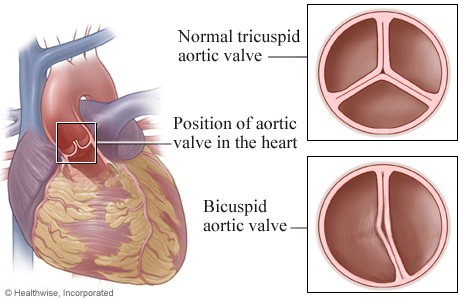Jump to
Bicuspid aortic valve

Some people are born with a bicuspid aortic valve, which has two flaps (leaflets). Usually, an aortic valve has three flaps (tricuspid valve).
How can you care for yourself when you have a bicuspid aortic valve?
- Do not smoke. If you need help quitting, talk to your doctor about stop-smoking programs and medicines. These can increase your chances of quitting for good.
- Eat heart-healthy foods. These foods include vegetables, fruits, nuts, beans, lean meat, fish, and whole grains. Limit things that aren't so good for your heart, like sodium, alcohol, and sugar.
- Get regular exercise. Try for 30 minutes on most days of the week. Ask your doctor what level of exercise is safe for you. If activity is not likely to cause health problems, you probably don't have limits on the type or level of activity that you can do.
- Stay at a healthy weight. Lose weight if you need to.
- Manage other health problems such as diabetes, high blood pressure, or high cholesterol. If you think you may have a problem with alcohol or drug use, talk to your doctor.
- Get vaccinated against COVID-19, the flu, and pneumonia.
Bicuspid aortic valve: When to call
Call 911 anytime you think you may need emergency care. For example, call if:
- You passed out (lost consciousness).
- You have symptoms of a heart attack. These may include:
- Chest pain or pressure, or a strange feeling in the chest.
- Sweating.
- Shortness of breath.
- Nausea or vomiting.
- Pain, pressure, or a strange feeling in the back, neck, jaw, or upper belly or in one or both shoulders or arms.
- Lightheadedness or sudden weakness.
- A fast or irregular pulse.
After you call 911, the operator may tell you to chew 1 adult-strength or 2 to 4 low-dose aspirin. Wait for an ambulance. Do not try to drive yourself.
Call your doctor now or seek immediate medical care if:
- You develop new symptoms such as shortness of breath, chest pain, or chest pressure, especially when you're active.
- You are dizzy or lightheaded, or you feel like you may faint.
- You have sudden weight gain, such as more than 2 to 3 pounds in a day or 5 pounds in a week. (Your doctor may suggest a different range of weight gain.)
- You have swelling in your legs, ankles, or feet.
Watch closely for changes in your health, and be sure to contact your doctor if you want help to make healthy lifestyle changes.
©2011-2026 Healthwise, Incorporated
The content above contains general health information provided by Healthwise, Incorporated, and reviewed by its medical experts. This content should not replace the advice of your healthcare provider. Not all treatments or services described are offered as services by us. For recommended treatments, please consult your healthcare provider.
